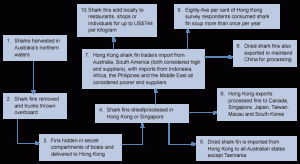Recently in my Arts Studies class, we read the collection Poems from Guantanamo: The Detainees Speak as part of our study of memory pertaining to 9/11 and the war on terror. The book contains a collection of poems, written in various styles, by detainees at the notorious Guantanamo Bay prison. The poems cover a range of tropes, mostly dealing though with a sense of frustrated longing. Another important aspect of the book though is the careful notice to give biographical context to each individual poet. One of these biographies reads, “Sheikh Abdurraheem Muslim Dost is a Pakistani poet and essayist…. Dost was a respected religious scholar, poet, and journalist… before his arrest in 2001” (Falkoff 33). These short biographies serve to contextualize the poem the reader is about to encounter, and possibly affect the way that the reader understands the message.
In our CAP geography class one concept we recently talked about was the idea of commodity fetishism, an aspect of consumer culture where the consumer only looks at a commodity or good (i.e. an iPhone, soccer ball, etc.) as an individual object (Barnes, 2015). Off of this idea, Marx has then argued a need to defetish – to grasp the real life of – a commodity. To “defetish” commodities, geographers often create commodity/supply chain analyses that trace the trajectory of a product, “from its conception and design, through production, retailing, and final consumption” (Barnes 2015). Below is an example of a commodity chain analysis for shark fins in East Asia.
Although this sonly one example of a commodity chain analysis, practically any physical good can be directed in this way. Can the process of defetishing commodities only apply to physical objects though? Looking at Poems from Guantanamo I would argue not, with the poets’ biographies as the main example. Without the biographies, the collection of poems would simply appear to come from an ambiguous, generalized prisoner. However, with the biographical context of each poet, the reader is reminded of the significance of each individual prisoner in Guantanamo Bay, in a sense “defetishing” them, and seeing how their lives outside of prison have affected the world. This act of human defetishing reminds us that each person is their own individual, and could be seen to contradict the narcissistic “us and them” dichotomy that has become so prevalent in the post-9/11 era.
Sources:
Barnes, Trevor. “Commodity Fetishism.” University of British Columbia. University of British Columbia, Vancouver, BC. 30 January 2015. Lecture.
Falkoff, Marc. Poems from Guantanamo: The Detainees Speak. Iowa City: U of Iowa, 2007. Print.
